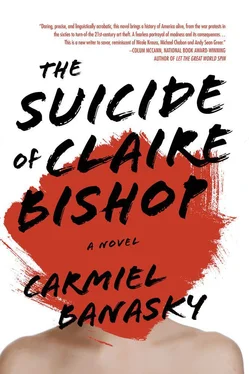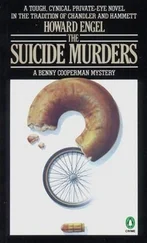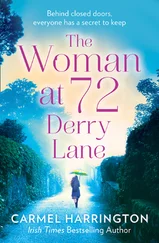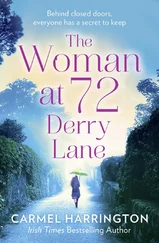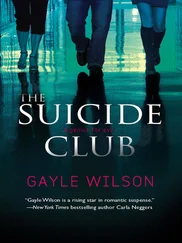Now she walked beside a man carrying a little girl on his shoulders. The child smiled down at her. They looked to one another from time to time to make sure they were doing all right — an unspoken pact. And yes, yes, they were doing all right.
She was in the protest now whether she liked it or not, so she might as well like it. She should join the cause. She should better herself. She should stop biting her nails. Yes, she’d plan a course of resistance and break habit. It was all about breaking habit. Feeling new again. She would shout out with the people. She would volunteer. She would find a hobby.
At Seventy-Second Street, the shouldered child screamed and pointed straight up in fear or in jest of fear. Claire followed the girl’s finger to the interrupted sky. Above, the seagulls squawked and circled like scavengers, as if the protestors were their midday meal. The birds glared in the sun and Claire had to squint in order to see: one bird was attacking the other mid-flight. Directly above the antiwar demonstration, a battle was underway.
Claire looked back at the girl and thought a terrible thought—
Whose thought was that? It couldn’t be hers. It must, absolutely must, belong to someone else.
Abruptly, she stopped walking as if she’d left something behind. Thrust forward, chest out and neck whipped back, she was on the ground. She looked up into the face of a man some hundred pounds heavier than her. “Watch it,” he said, not helping her up.
The image was of the child, Claire’s companion, taller than she. And a knife, which appeared in Claire’s hand. With it, she cut the child in two from top to bottom. A clean cut, like cheese. There was no blood. It did not belong to her.
The asphalt printed her hands. Her leg throbbed. She said nothing. Her safety depended on her silence. She would not be trampled. She would not be trampled. Her Macy’s bag was still on her, twisted around her shoulder. But her purse lay on the ground and there were so many feet and shins in her way. A large pair of patent leathers walked right over it like it was nothing. Claire risked a shout. But she couldn’t hear herself, even down here. She looked up for help. The child, high above and further ahead, reached down as if to catch Claire, but the shoulders walked on.
Claire was not a bad person. She was good, thoughtful. Every time an ambulance passed by on any street, she would pause and think — not pray, but think—“I hope they are all right. I hope, I hope.” The thought could not belong to her.
By making herself small, Claire managed to edge her way to the sidewalk, half crawling, crouching low. Her leg was crying out for attention but she couldn’t tend to it yet. She yelled at anyone who would listen. “Stop. My bag. Please stop.” No one stopped. There was a break, a hiccup of space. She limped in front of a group of old men, veterans from another war. She grabbed the purse wrong side up, felt her possessions falling but what did it matter now, back to the sidewalk, inching between two cops to a small safe space close to the buildings.
Her chest was in knots; she was alive. She’d nearly forgotten about her leg, and it throbbed as a reminder. Her stockings were ripped in a wide oval and there was a long scrape down the middle, following the line of her bone. Blood sprang new to the flesh, as if her acknowledgment of the wound drew it out.
Claire began to lower herself to the ground against the building but a policeman caught sight of her, motioning with his hand, up, up. “No one allowed on the sidewalks.”
“But my leg.” She tried to smile at him, but he’d already turned around and she must look awful anyhow. She searched the numbers of the apartments around her. Jackie Onassis was supposed to live somewhere very near. If only she could knock on Jackie’s door.
But there was someone whose door she could knock on. Her sisterin-law. Ex. Her soon-to-be-ex-sister-in-law lived on this block or the next, or was it the next? Samantha and her near-penthouse. A little wobbly, Claire squeezed north behind the backs of policemen, past the first two apartment entrances, and stopped at the third to scan the names. She did her best to ignore the hard stare of the doorman who wouldn’t open the door and had her stand outside like a lout, an outsider, thick glass and mahogany wood between them. The doorman and his doorman’s cap.
She found the name: not Bishop, but Ebert, Samantha’s deceased husband, already an old man when she’d married him. Claire pressed the buzzer. It was as if she’d released a valve; her whole body begged to cry, but she refused it permission. She would not walk into Samantha’s apartment a bloody mess and weeping too. Not in front of Freddie’s sister, who had always been civil with her and gave her knowing glances concerning the separation.
There was the doorman’s desk, and there the stairs. “Ebert,” she said to him brashly. She didn’t want him to call the elevator for her — she couldn’t wait in the lobby and risk breaking down in front of this man. Despite her leg, she took the six flights up the narrow stairwell, each step mechanical, a service her body did for her. Her mind didn’t move until her nose was nearly touching the brass plated 6R and she had already knocked.
The door opened and Samantha stared blankly at the red-nosed, wind-beaten Claire. “Can I help you?”
Samantha didn’t know her.
She couldn’t stop it: right on Freddie’s sister’s doorstep, big tears fell as if of their own agency, as if they weren’t even hers.
“Oh Claire!” Samantha said. “It’s you, I hardly recognized — what on earth? Come in, oh dear, my poor dear, what happened to you?”
Claire indicated downstairs as her sobs shook her whole form.
“I should have known. How did you get caught up with all that? What did they do?”
Samantha led her by the wrist to her living room on the west side of the building. Four long windows faced Fifth Avenue, overlooking the people below and the park beyond. It was a large, clean room that Claire felt unbearable in. Filthy Claire against the beige carpeting, the textured eggshell walls.
“I must look frightful,” Claire said finally. “I am so embarrassed, barging in like this.”
“Don’t be silly.” Samantha sat her down on the crisp white sofa. Claire made sure not to let her battered leg touch it. Seeing this, Samantha hurried out of the room to get “the fixings.”
Claire patted her eyes with the heel of her wrist as if she was done crying, but she wasn’t. There was a glass bowl of chestnuts on the coffee table in front of her. She reached for them, stopped, her grimy hand midair. She listened for Samantha, reached again. She brought a handful to her mouth and chewed violently as she cried.
Then silence. She thought she could hear the marchers from the street, but it was so far away. Like a memory of voices. She couldn’t be farther from it had she been on the moon. It made her miss being down there. She scanned her new surroundings, this immaculate egg of an apartment.
Through wet lashes, she saw it. Directly across the room. Above the mantel. The only piece hanging on the expansive wall.
The painting hadn’t changed since she’d last seen it, save for the missing corner. The sky was still that laughing shade of blue. She was still falling in pieces from the bridge. She was still dead.
She leaned back on the couch, closed her eyes. She wasn’t asleep, couldn’t have fallen so quickly, yet she was consumed by the briefest nightmare: the little girl — the two halves of her in either of Claire’s arms. Claire tried to comfort her.
She clicked open her eyes. The light was different. But no time had passed, had it? Samantha rustled in with a wet rag and a bandage and a noose. No, she wasn’t carrying a noose.
Читать дальше
